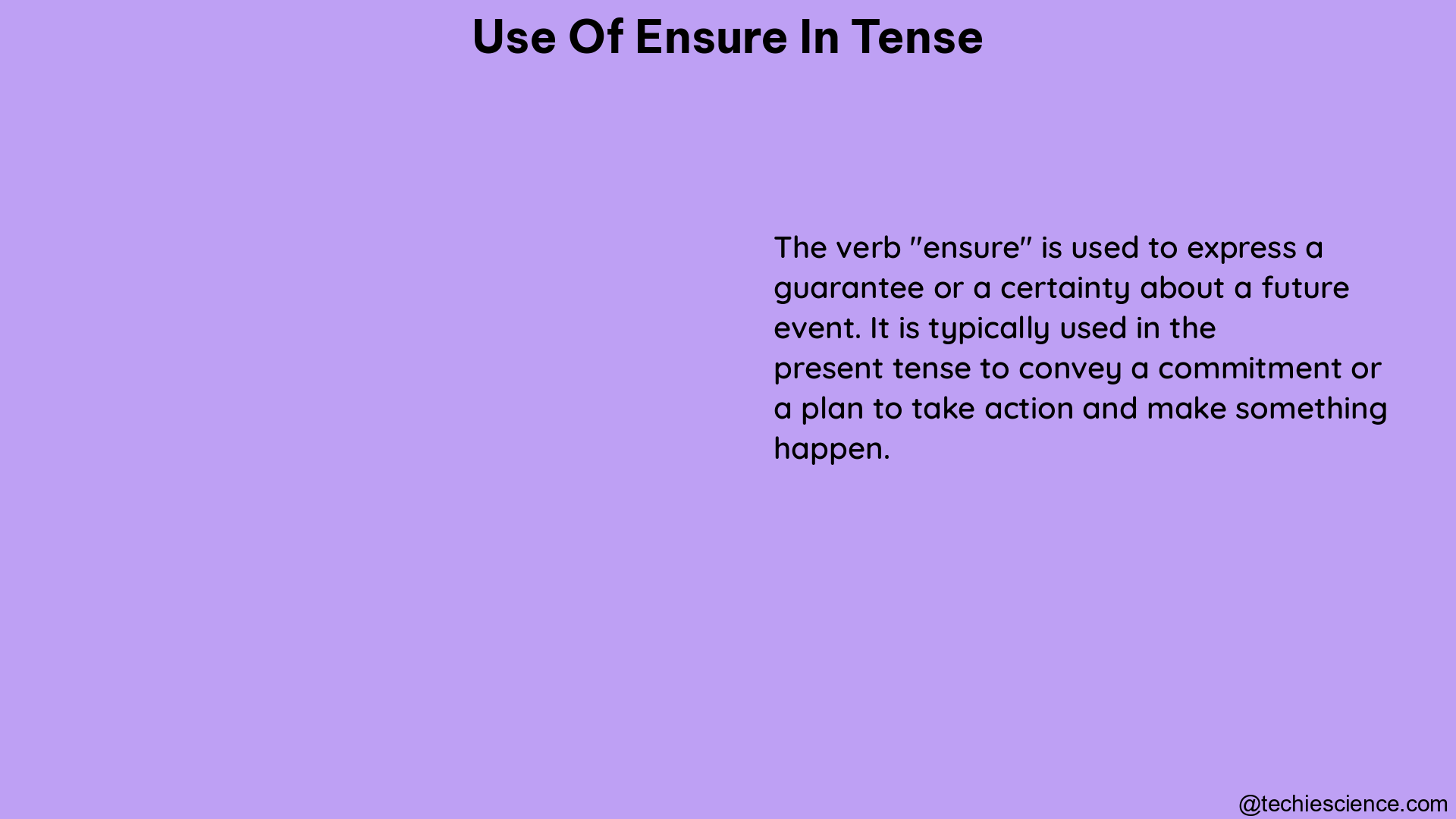The use of the verb “ensure” in various tenses is a crucial aspect of English grammar that can often confuse even the most proficient language learners. This comprehensive guide will delve into the intricacies of using “ensure” in the present, past, and future tenses, as well as the subjunctive mood, providing you with a deep understanding of this versatile verb and its applications.
Present Tense
Present Simple
The present simple tense of “ensure” is used to express general truths or habitual actions. It conveys a sense of consistency and reliability in the action.
Example: “I ensure that all tasks are completed on time.”
Present Continuous
The present continuous tense of “ensure” is used to describe ongoing actions, emphasizing the current nature of the process.
Example: “I am ensuring that all tasks are completed on time.”
Present Perfect
The present perfect tense of “ensure” is used to describe completed actions that have a connection to the present. It highlights the relevance or impact of the action in the current context.
Example: “I have ensured that all tasks are completed on time.”
Present Perfect Continuous
The present perfect continuous tense of “ensure” is used to describe ongoing actions that have a connection to the present. It emphasizes the duration and continuity of the action.
Example: “I have been ensuring that all tasks are completed on time.”
Past Tense

Past Simple
The past simple tense of “ensure” is used to describe completed actions in the past, without any specific connection to the present.
Example: “I ensured that all tasks were completed on time.”
Past Continuous
The past continuous tense of “ensure” is used to describe ongoing actions in the past, highlighting the duration and progression of the action.
Example: “I was ensuring that all tasks were completed on time.”
Past Perfect
The past perfect tense of “ensure” is used to describe completed actions in the past that have a connection to another past action. It establishes a hierarchical relationship between the two past events.
Example: “I had ensured that all tasks were completed on time.”
Past Perfect Continuous
The past perfect continuous tense of “ensure” is used to describe ongoing actions in the past that have a connection to another past action. It emphasizes the duration and continuity of the action in relation to the other past event.
Example: “I had been ensuring that all tasks were completed on time.”
Future Tense
Future Simple
The future simple tense of “ensure” is used to describe future actions, conveying a sense of certainty or intention.
Example: “I will ensure that all tasks are completed on time.”
Future Continuous
The future continuous tense of “ensure” is used to describe ongoing actions in the future, highlighting the continuous nature of the action.
Example: “I will be ensuring that all tasks are completed on time.”
Future Perfect
The future perfect tense of “ensure” is used to describe completed actions in the future that have a connection to another future action. It establishes a hierarchical relationship between the two future events.
Example: “I will have ensured that all tasks are completed on time.”
Future Perfect Continuous
The future perfect continuous tense of “ensure” is used to describe ongoing actions in the future that have a connection to another future action. It emphasizes the duration and continuity of the action in relation to the other future event.
Example: “I will have been ensuring that all tasks are completed on time.”
Subjunctive Mood
The subjunctive mood is used to express doubt, uncertainty, or possibility. It is often used in clauses beginning with “that” or “wish.”
Example: “It is essential that the client ensures accurate records are kept.”
Examples of “Ensure” in Different Contexts
To Ensure That
This usage of “ensure” is employed to express a condition or requirement, often followed by a clause.
Example: “The client must ensure that accurate records are kept.”
To Ensure
This usage of “ensure” is used to express a purpose or intention, without a specific clause following it.
Example: “I brought 100 dollars to ensure that I had enough money.”
Key Points to Remember
- Tense Consistency: Ensure that the tense used after “ensure” is consistent with the main verb in the sentence.
- Subjunctive Mood: Use the subjunctive mood when expressing doubt, uncertainty, or possibility.
- Contextual Meaning: Choose the correct tense based on the intended meaning of the sentence.
Reference Links
- Collins Dictionary – Ensure Conjugation
- Stack Exchange – The Right Verb After “Ensure”
- WordReference Forums – To Ensure That
Hey! I am Arpita Bose Roy. My qualifications are M.A. in English with B. Ed. in both general education and special education. I have 2 years of experience as a “language analyst” at IIT Kharagpur and 4 years of experience as an “Academic Content Developer” at IIT Kharagpur. Currently, I am working as an academic writer at Lambdageeks.